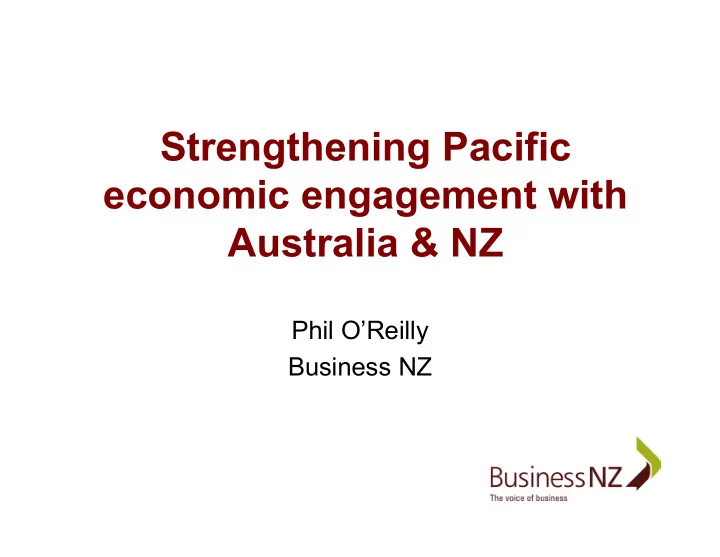

Strengthening Pacific economic engagement with Australia & NZ Phil O’Reilly Business NZ
Economic engagement not just Pacific issue •World has entered phase of increased economic engagement •We in the Pacific can gain from the lessons of increased economic integration elsewhere
Potential challenges from economic engagement • ‘Hollowing out’ – population/brain drain from small centres • Encourages credit-based economics → volatility, debt risks e.g. Asian crisis 1997 • Local cultures weakened? • National sovereignty undermined?
Potential integration benefits •Greater trade flows •Greater returns from specialisation •Stable international institutions (WTO, ILO etc) •More widespread use of technology •Pressure for democracy, openness, transparency •Overall, economic engagement a good thing
Who loses? Q: Which countries lose out in context of greater economic engagement? A: Countries that: - erect or maintain trade barriers - don’t specialise - don’t enforce rule of law - deter investment
Who gains? Q: Which countries benefit from more economic engagement? A: Countries that: - make free trade deals - specialise to sell to defined markets - create business-friendly environments
Business-friendly environment: • Rule of law: fair enforcement, corruption-free • Light-handed regulation, easy for business to comply • Regulation that doesn’t deter foreign investment • Investment in education, skills • Investment in infrastructure
Enablers Pacific nations wishing more economic engagement with Aust, NZ could consider policy moves towards: - specialisation of goods & services - investment-friendly environment - more open trade to encourage specialisation
Enablers - specialisation • ‘Doing what you do best’ • Tourism (natural environment, hospitality) • Specialised crops sugar, kava etc • Others? – increasingly, we all have to fiind more • Have to move up the value chain • Where are your new areas of speciality to be found?
Look to your strengths • Finding new areas for specialisation involves considering your competitive advantages – resources & people • Pacific people strengths – open, friendly, hard-working, sense of family, sense of community, have great contacts in many parts of the world…. • How do you see your strengths?
Specialisation case study: kava • Traditional medicine – analgesic, tranquilliser, anti-depressant, also ceremonial uses • 1990s: significant kava industry in Vanuatu, Fiji, Samoa, Tonga • 10,000 hectares under cultivation • US$200 million annually from US, Europe
Specialisation threatened • 2002: Germany banned kava products • Evidence linked kava to liver disease • Other EU countries followed suit • But Pacific growers had invested heavily in kava specialisation → economic loss
Pacific response • Individual Pacific countries could not fight the ban alone • Grouped together with European drug industry reps, alerted WTO • Requested World Health Organisation inquiry into kava ban • Medical literature surveyed
Review of kava ban • Inquiry found kava dangers overestimated by German authorities • New studies initiated • Germany now reviewing kava ban What worked: • Pacific nations worked as a team • Made good use of international institutions
Other enablers - dialogue Regional dialogue e.g. recent ILO-Business NZ Pacific Workshop brainstormed responses to Vanuatu, PNG, Samoa, Fiji, Solomons, Kiribati issues: - overtaxation - political corruption - political volitality - overregulation of business
Enablers – resident links Resident links • Useful to create database of Pacific Island people living in Australia, NZ • Keep in touch with those residents • They are a connecting ‘bridge’ • Support network for individuals • A base for outreach initiatives
Enablers - education Education • Education of Pacific Island people in Aust, NZ creates communities of interest in both countries • (Similar to effect of 1960s Colombo Plan in NZ – forged relationships that are paying off now)
Enablers – leadership Leadership Changes required to improve economic engagement start at the top • Leaders must model attitudes to education, transparency, rule of law • Hard policy issues – overtaxation, overregulation, corruption can only be attacked by lawmakers
Enablers - partnerships Partnerships • For education – more NZ/Pacific education initiatives may now be possible with growth in PTEs in NZ • For infrastructure – PPPs possible with private or public sector organisations in NZ & Pacific
We’re all in same boat • Australia & NZ the same as other Pacific nations • In global context, we all have relatively small populations • Our citizens migrate to larger centres • In global context, we all are relatively small economies
Remoteness • As Pacific nations we’re all remote from the rest of the world • But isolation can be a benefit • Free from ‘old world’ paradigms • Less danger from terrorism, disease • How can the Pacific use remoteness to its advantage?
Economic engagement • Globally, all of us in the Pacific are ‘close to the edge’ • We can use the positive forces of economic engagement • Need to get past old paradigms • Economic engagement in the Pacific is in all our interests
Recommend
More recommend